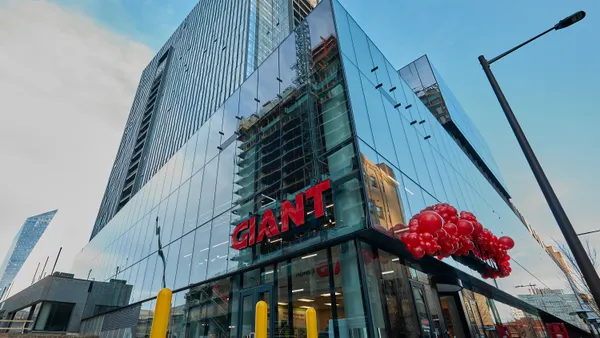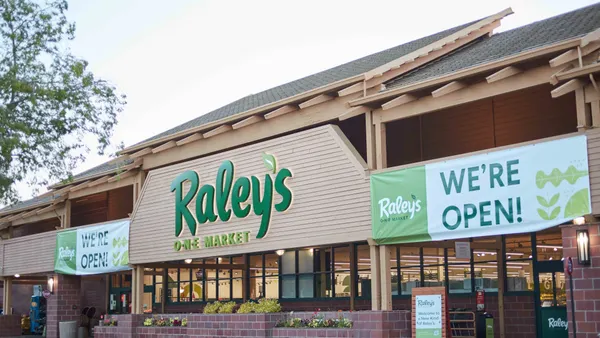Dive Brief:
- Ahold Delhaize saw net sales rise 1.5% to €15.9 billion ($17.8 billion) in its first quarter fiscal 2019 earnings report. The retailer reported net sales were negatively impacted by Easter, which fell in the second quarter last year but first quarter this year. Net consumer online sales were up 25% and on track to reach its target goal of €7 billion ($7.8 billion) by 2021, executives said.
- The Netherlands-based grocery retailer reported underlying operating margin up 2.2%, which was stable year-over-year and net income of €435 million ($487 million), up 2.4% from Q1 2018.
- Its quarterly performance in the U.S. was not impacted by the Stop & Shop strikes that took place over 11 days in April. The strike had $90 million to $110 million one-off impact on underlying operating profit, Ahold Delhaize president and CEO Frans Muller said last month, while total sales loss totaled more than $200 million.
Dive Insight:
Ahold Delhaize saw growth in both its top and bottom line when compared to last year’s first quarter, which the company attributes to its brand-centric approach that also mines synergies across the company. The strategy is focused on growing comparable sales and gaining market share over the next three years.
Ahold Delhaize’s U.S. business, which comprises roughly two-thirds of total sales, saw margins positively impacted by synergies, which totaled €81 million ($91 million) in the U.S. in Q1.
The company's leading spot in many of its markets coupled with its remodeling efforts help it compete from a position of strength. However, the Stop & Shop strike was unexpected, and could negatively impact the retailer beyond the roughly $100 million impact to profits it projected. Geolocation firm Skyhook estimated that loyal customer visits declined 75% during the strike, and the company will likely need to up its marketing investment to bring those shoppers back in and secure their loyalty.
"It is certainly possible in a hyper-competitive marketplace that Ahold will need to promote heavily to get back all the customers," analysts with Wolfe Research wrote in a note to investors.
During the company's earnings call, president and CEO Frans Muller said customers are returning to stores and that Stop & Shop's supply chain has recovered. The chain and the five northeast United Food and Commercial Workers unions last week ratified their new contract, which includes higher pay for full- and part-time employees and higher pension contributions from the company.
"We are concentrating on recovering the business," Muller said.
Ahold Delhaize has adjusted its full-year outlook to reflect the strikes. It now anticipates underlying operating margin for 2019 to be lower than 2018 and revised its percentage growth of underlying earnings per share for the year from high single digits to low single digits. But the retailer is holding ground on its 2019 expectations for free cash flow to reach $2 billion and capital expenditures $2.2 billion.
"We remain committed to maintaining a balance between investing in our stores and rapidly growing our online businesses and an efficient, solid capital structure," Muller said in a statement
These capital expenditures include the $158 million the retailer is investing in remodeling 92 Food Lion stores in South Carolina and 23 stores in Virginia. Giant Food, meanwhile announced its $175 million investment in expansion.
In its e-commerce efforts, the retailer opened an e-commerce hub in Lancaster, Pennsylvania with Peapod and launched “Giant Direct” e-commerce hubs, which offer pickup as well as same-day delivery to areas where only next-day delivery was available. Ahold Delhaize expects U.S. e-commerce sales to grow 20% this year and 30% next year.














